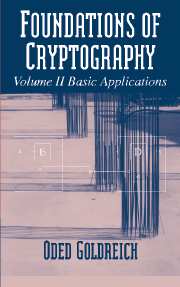7 - General Cryptographic Protocols
Published online by Cambridge University Press: 04 May 2010
Summary
The design of secure protocols that implement arbitrarily desired functionalities is a major part of modern cryptography. Taking the opposite perspective, the design of any cryptographic scheme may be viewed as the design of a secure protocol for implementing a suitable functionality. Still, we believe that it makes sense to differentiate between basic cryptographic primitives (which involve little interaction) like encryption and signature schemes, on the one hand, and general cryptographic protocols, on the other hand.
In this chapter we consider general results concerning secure multi–party computations, where the two–party case is an important special case. In a nutshell, these results assert that one can construct protocols for securely computing any desirable multi–party functionality (see the following terminology). Indeed, what is striking about these results is their generality, and we believe that the wonder is not diminished by the (various alternative) conditions under which these results hold.
Our focus on the general study of secure multi–party computation (rather than on protocols for solving specific problems) is natural in the context of the theoretical treatment of the subject matter. We wish to highlight the importance of this general study to practice. Firstly, this study clarifies fundamental issues regarding security in a multi–party environment. Secondly, it draws the lines between what is possible in principle and what is not. Thirdly, it develops general techniques for designing secure protocols. And last, sometimes it may even yield schemes (or modules) that may be incorporated in practical systems.
- Type
- Chapter
- Information
- Foundations of Cryptography , pp. 599 - 764Publisher: Cambridge University PressPrint publication year: 2004
- 25
- Cited by



